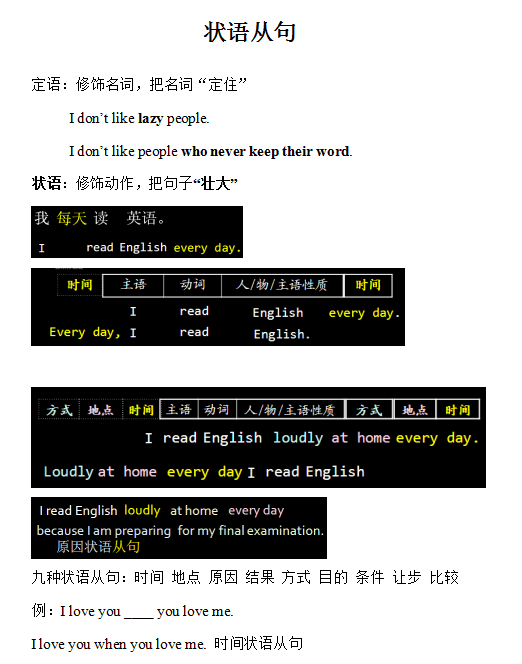2020年高三英语一轮复习,状语从句核心考点系统复习
http://www.newdu.com 2025/11/18 08:11:30 三好网 佚名 参加讨论
高三英语辅导老师整理了2020年高考英语一轮复习状语从句核心考点系统复习,收藏查看吧!   I love you where you love me. 地点状语从句 I love you because you love me. 原因状语从句 I love you so you love me. 结果状语从句 I love you as you love me. 方式状语从句 I love you in order that you love me. 目的状语从句 I love you if you love me. 条件状语从句 I love you even if you don’t love me. 让步状语从句 I love you more than you love me. 比较状语从句 一、时间状语从句 【when, while , as(当)before, after, since, till, until ,as soon as, the minute, the moment,the instant,immediately, directly, no sooner...than… ,hardly...when…,scarcely...when… 】 例: 1.—What was the party like —Wonderful. It’s years _____ I enjoyed myself so much. A. after B. before C. when D. since 2.It is 50 years _____________the People’s Republic of China was founded. A. after B. before C. when D. since 3._____ the sun rises, all the stars in the sky disappear. A. The moment B. Before C. Till D. For 4.The new secretary is supposed to report to the manager as soon as she _______. A. will arrive B. arrives C. is arriving D. is going to arrive 5.Remember to send me a photo of your son next time you _____ to me. A. write B. will write C. are writing D. would write 6.________ I saw the computer, I showed great interest in it. A. At first B. For the first time C. Until D. The first time 7.Why do you want a new job _____ you got such a good one already A. that B. where C. which D. when 1. while, as和when ①When强调点,也可接持续性动作。 Eg:He was running when I saw him. I was watching TV when the thief came in. _____ his plane arrived at the airport in Paris, I had already left for Los Angeles. A.While B. Until C. When D.As ②while持续性动作或状态 Eg:He was dead silent while I was writing. Don’t laugh while you are praying. (2009辽宁)It just isn’t fair. ______ I was working as a waiter last month, my friends were lying on the beach. A.whenever B. though C. for D. while ③as伴随或较短的时间内 Eg:As I was speaking, some of you were sleeping. 1.Mother was worried because little Alice was ill, especially _______ Father was away in France. A. as B. that C. during D. if 2.As she ____ the newspaper, Granny ____ asleep. A. read, was falling B. was reading, fell C. was reading, was falling D. read, fell 2.till / until的用法 A warning news report from Qatar announces that a group of terrorists will continue to kill Americans wherever they are ________ they leave the Arab world forever. A. even though B. in case C. whenever D. until  二、地点状语从句 where 三、原因状语从句 because, since, as(因为) , now that, in that 四、结果状语从句 so … that... ,such… that… 1.After the war, a new school building was put up ___________there had once been a theatre. A. that B. where C. which D. when 2.There were some chairs left over ______ everyone had sat down. A.when B. until C. that D. where 3.It must have rained last night, _____the ground is wet this morning. A. since B. because C. as D. for Since:既然(双方已知,显而易见) Because:因为(直接原因) As:由于(双方已知) For:因为(表示对结果的“解释”/“推断”) 4._______the rain has stopped, let’s continue to work. A. For B. Now that C. That D. Because 5._____ you are free tonight, why not drop in and play chess with me A. For B. Since C. Because D. Even if 6.Why not buy a cheaper one, _____ you don’t have enough money A. since B. because C. for D. though 7.It was _____ he was ill that he didn’t go with us. A. since B. for C. as D. because 比较:because,since,as和for 1) because语势最强,用来说明人所不知的原因,回答why提出的问题,是句子中的重要部分,常放在句末,不能用其它三个替换。逗号可加可不加。 You can trust those products because the quality never changes. I haven”t been to the cinema lately,because I am too busy. I didn’t go,because I was afraid. 2)当原因是显而易见的或已为人们所知,就用as或 since,since稍正式一些。 Since /As the weather is so bad,we have to delay our journey. 3) 由because引导的从句如果放在句末,且前面有逗号,则可以用for来代替。但如果不是说明直接原因,而是多种情况加以推断,就只能用for。 He is absent today,because / for he is ill. He must be ill,for he is absent today. 4)当because引导的从句与否定的主句连用,而主句又位于句首时,之前不用逗号,因为主句动词否定的是其后的全部内容。为了突出 because从句,because 前常加上副词,如:just,only,simply,chiefly等;在这种情况下,常常会形成否定的转移。如果是在口语中,在because前要有一个停顿(逗号),才能表示出否定没有转到 because从句中.如: You should not despise a man just because he is poorly dressed. She is not marrying Bill,because he is poor. 五、方式状语从句 as(以…方式), as if/ as though Why is she looking at me as though she knew me 他为什么那样看我?像是认识我似的。 He behaves as if he owned the house. 他的样子好像他拥有这个房子。 六、目的状语从句 so that, in order that ,lest, in case, for fear that 七、条件状语从句 if, once, as/so long as, unless She doesn’t speak ____________her friend, but her written work is excellent. A. as well as B. so often as C. so much as D. as good as He speaks English _____________he speaks his mother tongue. A. so good as B. as good as C. so well as D. as well as You will be late ________ you leave immediately. A. unless B. until C. if D. or 八、让步状语从句 though, although, even if, even though, as(尽管) , while (虽然,而), whatever, whoever, wherever, whenever, however, whichever no matter… 九、比较状语从句 than 1.______ I accept that he is not perfect, I do actually like the person. (2004 江苏) A.While B. Since C. Before D. Unless 2.We won’t give up ______________we should fail ten times. A. even if B. since C. whether D. until 3.Allow children the space to voice their opinions, ______ they are different from your own. (2005 湖南) A.until B. even if C. unless D. as though 4.If we work with a strong will, we can overcome any difficulty, ______________great it is. A. what B. how C. however D. whatever 5.________, Mother will wait for him to have dinner together. A. However late is he B. However he is late C. However is he late D. However late he is though, although Smart though he is ,he can make stupid mistakes sometimes. Driver though he is, he sings like a pop-star. Though/although exhausted, he kept on working till midnight. as ______, he can never solve the problem alone. A.Clever and intelligent he is B.Clever and intelligent as he is C.As he is clever and intelligent D.As clever and intelligent he is 一 .when 用作副词. 1.用作疑问副词,引导特殊疑问句.例如: When will you come to see me 你什么时候要来看我 When are they going to visit the Great Wall 他们打算什么时候去游览长城 2.用作连接副词,通常用来引导主语从句、表语从句、同位语从句、宾语从句及起名词作用的“ when +动词不定式”结构.例如: When he comes is not known.他何时来还不知道. The morning is when I am busiest.早上是我最忙的时候. I have no idea when the game will begin.我不知道比赛何时开始. I don't know when the plane takes off.我不知道飞机何时起飞. I don't know when to leave for London.我不知道该在何时动身去伦敦. 3.用作关系副词,引导限定性定语从句和非限定性定语从句.例如: Do you still remember the days when we stayed in America 你还记得我们呆在美国的那些日子吗 The day will come soon when the Chinese astronauts will go to the moon.中国宇航员登上月球的那一天很快就要到来了. It happened ten years ago,when I was a child.事情发生在十年前,当时我还是个小孩子. We will go to the countryside at the beginning of June,when the summer harvest will start.我们将在六月初下乡,那时夏收就要开始了. 二 .when 用作连词. 1.用作从属连词,意为“当……的时候”,引导时间状语从句.例如: They learned a lot from the peasants when they stayed in the village. 他们住在那个村子时,从农民那里学到了许多东西. It was snowing when he arrived at the station.他到达车站时,天正下着雪. 注意:如果 when 引导的从句中的主语和主句中的主语一致,且从句中的谓语动词是“ be +分词”或从句主语是 it ,则 be 动词及其主语常可省略.例如: When ( he was ) asked why he was late,he made no answer.当被问到他为什么迟到时,他避而不答. I'll tell him about it when ( it is ) possible.在可能的时候,我会把那件事告诉他的. 2.用作从属连词,意为“一……就……”,引导时间状语从句.例如: We will stand up when the teacher comes into the classroom.老师一进教室我们就起立. Fire the rockets when I give the signal.我一发信号,你就点燃火箭. 3.用作从属连词,意为“还没 / 刚刚……就”,引导时间状语从句.例如: I had hardly opened the door when he came in.我刚一开门,他就进来了. I had not been reading for half an hour when I heard someone call my name.我刚刚看了半个小时的书,就听到有人叫我的名字. 4.用作从属连词,意为“倘若,如果”,表示条件.例如: He will be likely to recover when he is operated on.如果动手术,他有可能康复. Turn off the switch when anything goes wrong with the machine.如果机器发生故障,就把电源关上. 5.用作从属连词,意为“既然,尽管”,表示让步.例如: Why use metal when you can use plastic 既然能用塑料,为什么用金属呢 They kept trying when they knew it was hopeless.尽管他们知道那件事没有希望,可是他们还在不断地努力. 6.用作并列连词,意为“在那时,届时”,表示时间.这时主句中可以用过去进行时,过去完成时或“ was/were about to do sth.”结构.例如: Last night I was about to go to bed when the phone rang.昨天晚上我正要上床睡觉时,电话铃响了. I was cooking in the kitchen when someone knocked at the door.我正在厨房做饭,这时有人敲门. He had just finished the book when supper was served.我刚刚读完这本书,这时晚饭就端上来了. 7.用作并列连词,意为“虽然、然而、可是”,表示转折.例如: He usually walks to work when he might take a bus.虽然他可以坐公共汽车上班,但他却常常步行上班. I had only twenty dollars when I needed thirty to buy the dictionary. 我需要 30 美元买那本字典,可是我只有 20 美元. 8.用作并列连词,意为“而、却”,表示对比.例如: How can he say that everything is fine when it's obvious that it is not 他怎能说一切都好呢 情况显然不是那样. 三 .when 用作代词. when 作为代词常常位于介词之后,意为“那时,什么时候”.例如: We came back on Tuesday,since when we have been working in the repair shop.我们星期二回来,从那时起就一直在修配车间工作. Since when have you been studying Japanese 你是从何时起一直学习日语的 另外,when 还可用作名词,前面常常用定冠词 the .the when 表示事件发生的时间,常常与 the where,the how 并列使用.例如: He told the police the when and the how of the accident.他告诉警察事故发生的时间及发生的原委. 一、as作连词的用法 1. as...as的用法 as...as意为"和……一样",表示同级的比较。使用时要注意第一个as为副词,第二个as为连词。其基本结构为:as+ adj./ adv. +as。例如: (1)This film is as interesting as that one.这部电影和那部电影一样有趣。 (2)Your pen writes as smoothly as mine.你的钢笔书写起来和我的一样流畅。 其否定式为not as/so +adj./ adv. +as。例如: This dictionary is not as/so useful as you think.这本字典不如你想象的那样有用。 若有修饰成分,如twice, three times, half, a quarter等,则须置于第一个as之前。例如: Your bag is twice as expensive as mine.你的袋子比我的贵一倍。 几个关于as...as的常见句型: (1)as...as possible Please answer my question as soon as possible.请尽快回答我的问题。 (2)as...as usual/before She looks as pretty as before.她看起来和以前一样漂亮。 (3)as long as... It took us as long as three years to carry out the plan.我们花了长达三年的时间才完成这项计划。 (4)as far as He walked as far as the railway station yesterday evening.昨天傍晚,他一直散步到火车站。 (5)as well as She cooks as well as her mother does.她烧菜烧得跟她母亲一样好。 一些带有as...as结构的常见短语归纳: as busy as a bee像蜜蜂一样忙碌 as easy as ABC像ABC一样容易 as deep as a well像井一样深 as light as a feather像羽毛一样轻 as soft as butter像黄油一样软 2. as用作连词引导时间状语从句 The new secretary is supposed to report to the manager as soon as she arrives. 3. as用作连词引导原因状语从句 as,because,since都可以表示因果关系,连接原因状语从句,含义是"因为,由于",但它们有区别:because表示的语气最强;as一般放在句首,语气较弱,较口语化;since常常用在书面语中,表示多为对方已知的、或稍加分析便可得知的原因,有时可译作"既然"。例如: (1) He will succeed because he is in earnest.他一定会成功,因为他很认真。 (2) Since you are so sure of it he”ll believe you.既然你对此如此有把握,他会相信你的。 (3) As rain has fallen, the air is cooler.因为下过雨,空气比较清爽。 4. as作连词引导让步状语从句 as与although (或though),however (或no matter how)等都可以引导让步状语从句,含义是"虽然,尽管",但它们有区别: although语气稍正式些,可放在句首,也可放在句中,主句中不能再用but,但可以用yet; as所表示的语气较强,引导的让步状语从句用倒装语序; however引导让步状语从句时,它的后面可跟形容词或副词,也要用倒装语序。例如: (1) Although he is quite old, he still jogs every day.他虽然年纪相当大,仍然每天慢跑。 (2) Strange as it may seem, nobody was injured in the accident.这次意外虽然显得令人不可思议,却没有人受伤。 (3) However hard he may try, he will not attain his goal.无论他怎样努力也达不到目标。 二、as作关系代词的用法 关系代词as引导定语从句时,既可以单独使用,也可以与其他词连用,其用法要比that和which更为复杂。 1. as引导定语从句与其他词连用 ①用于the same...as结构中 This is the same book as I read last week.这本书和我上周读的那本是一样的。 ②用于such...as结构中 I don”t like such books as he recommends.我不喜欢他推荐的那些书。 ③用于"so +adj. + a/an + n. (单数) + as "结构中 I am not so strong a man as I was.我已经没有从前那么强壮了。 2. as单独引导定语从句 as单独引导定语从句时,先行词可以是一个词,也可以是一个句子或短语。例如: (1) She is late, as is often the case.她迟到了,这是经常的事。(先行词是整个主句) (2) To shut your eyes to facts, as many of you do, is foolish.对事实视而不见--你们好多人都是如此的愚蠢。(先行词是不定式短语) 三、as作介词的用法 as作介词,意思是"作为","以……身份"。例如: He came to China as a tourist five years ago.他五年前以游客的身份来过中国。 四、as作副词的用法 to the same degree or amount; equally "相同地","同样地"。例如: They don”t have as many airplanes.他们没有同样多的飞机。 本文内容来源网络,如有侵权,请及时联系我们删除。 (责任编辑:admin) |